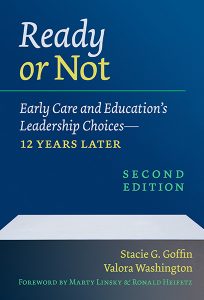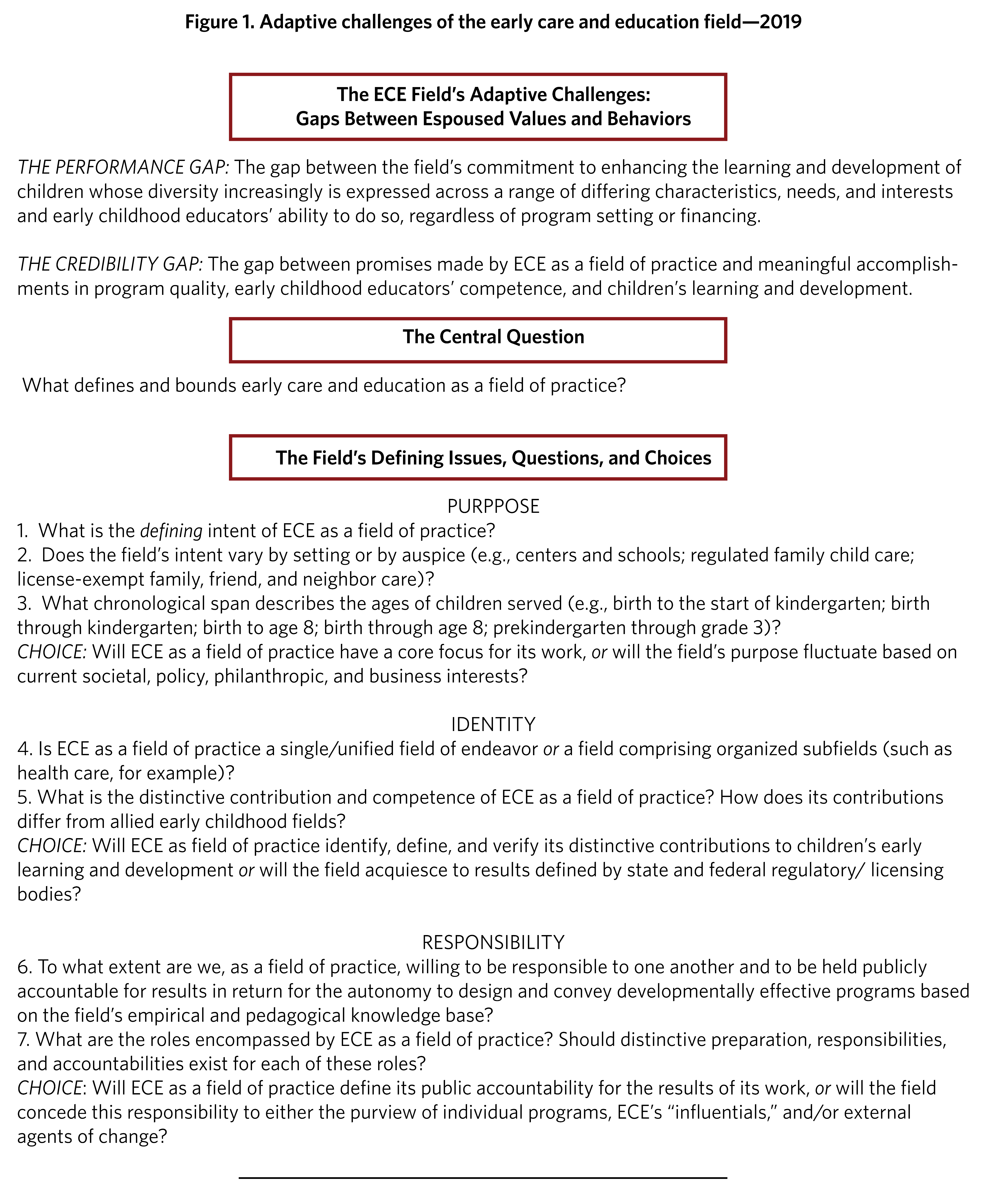By Stacie G. Goffin and Valora Washington
Twelve years ago, in 2007, Ready or Not: Leadership Choices in Early Care and Education, provocatively put forth the question of what defines and bounds early care and education (ECE) as a field of practice. Twelve years later, the field’s defining questions remain unanswered. And it’s showing!
As authors of the book’s second edition, we feel compelled to reignite a field-wide conversation because we believe it’s essential to ECE’s future as a field of practice. Too many children are loosing ground and too many others aren’t accessing their potential—and the same can be said for early childhood educators. ECE continues to lack a sense of collective urgency regarding the developmental implication of its challenges, and its absence bodes poorly for the field’s future.
Failing to make note of this ongoing reality no longer felt acceptable. Twelve years later, we aspire to galvanizing those of us in ECE to step forward and engage with the field’s adaptive and systemic challenges. In the absence of our collectively stepping forward — even with evidence making evident that children in ECE programs are not progressing as they should — philanthropists, business leaders, national organizations, and city, state, and federal governments have positioned themselves as change agents on the field’s behalf, especially for children in need of the cognitive and social and emotional boost that good ECE programs provide. As a result, ECE’s ability to define itself as a field of practice is waning as its sense of empowerment on its own behalf succumbs to unremitting external interventions.
Confronting ECE’s Adaptive and Systemic Challenges
To move forward, the ECE field needs to confront its two adaptive challenges: its Performance and Credibility Gaps. These gaps exist because of breaches between the field’s espoused values and its behaviors. While not often thought of as gaps, when presented as such, confronting them becomes a matter of integrity. Notably, their representation in 2019, versus 2007, documents the extent to which sidestepping ECE’s adaptive and systemic challenges has intensified its challenges as a field of practice.
The field’s performance gap is between its commitment to enhancing the learning and development of children whose diversity increasingly is expressed across a range of characteristics, needs, and interests and early childhood educators’ ability to do so, regardless of program setting or financing stream. Its credibility gap spans the distance between public promises made by ECE as a field of practice and meaningful accomplishments in program quality, early childhood educators’ competence, and children’s learning and development.
As authors, we’ve concluded these gaps cannot be addressed without a field-wide response to the question of what defines and bounds ECE as a field of practice. In turn, confronting this central question requires grappling with issues, questions, and choices that delineate and distinguish ECE as a field of practice. (See Figure 1 below).
The field’s inability to define it purpose, coalesce around a shared identity, and accept collective responsibility for specialized knowledge and practice speaks to our uncertainty regarding ECE’s raison d’être as a field of practice. The result is a level of fragmentation and inconsistency harmful to children, families, early childhood educators, and to society overall. Notably, not only are children being denied opportunities to fulfill their potential, so is the ECE field.
A Call to the Future
As we observe the field’s responses to its changing landscape, we see continuing evidence of ECE’s factions coalescing around its characteristic views and self-interests. To secure sustainable field-wide change, each of us will need to depart from our predicable responses and engage with deeper levels of learning essential to resolving internal contradictions; make use of what’s learned to navigate the complexities of adaptive and systemic change; and commit to developing the field-wide capacity necessary for re-configuring ECE’s systems so their behaviors coincide with the field’s values and practice obligations. Towards this end, three next steps are proposed:
Action Step #1: Ground the choices ahead in foundational values and principals
Action Step #2: Assume responsibility for the ECE field’s adaptive and systemic challenges
Action Step #3: Make the conscious choice to embrace change and become active learners.
The ECE field’s choices are defining its future as a field of practice. We’re calling on the field to redirect ECE’s developmental trajectory not only for the purpose of closing its Performance and Credibility Gaps. We also want to open the way for moving beyond applying fixes that are a mismatch for the field’s systemic challenges. We’re calling upon each of us to imagine what’s possible for ECE as a field of practice so children and families can more fully realize the field’s benefits.
We can begin by engaging with the adaptive and systemic work that can bring the field’s potential to fruition.
…The ball is in our court.
Featured Image: Children in Kindergarten Enjoying Tunnels, public domain via Pixabay.
Stacie G. Goffin, EdD, is principal of the Goffin Strategy Group. Established in 2004, the Goffin Strategy Group dedicates itself to building early childhood education’s ability to provide effective programs and services for young children through leadership, capacity, and systems development
Dr. Valora Washington is the chief executive officer of the Council for Professional Recognition and the founder of the CAYL Institute. She has served on numerous federal, state, and local boards or commissions and coauthored over 50 publications.


